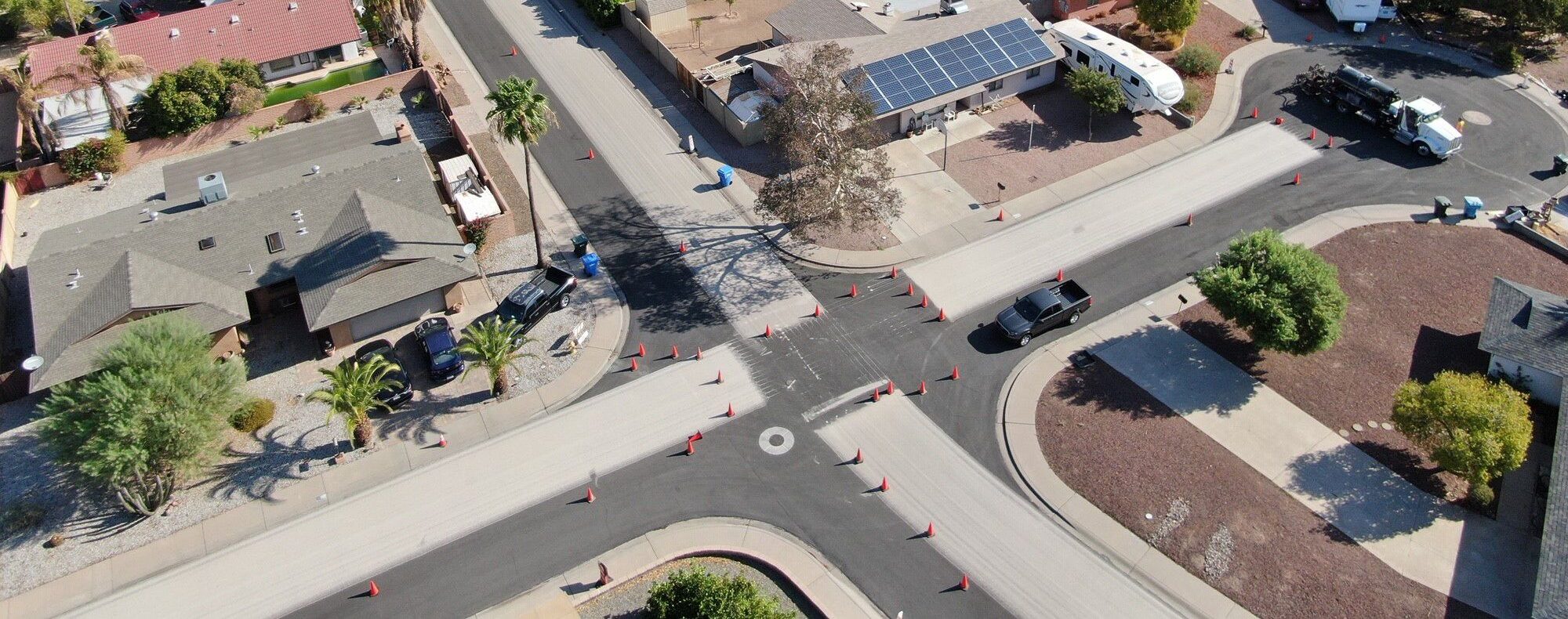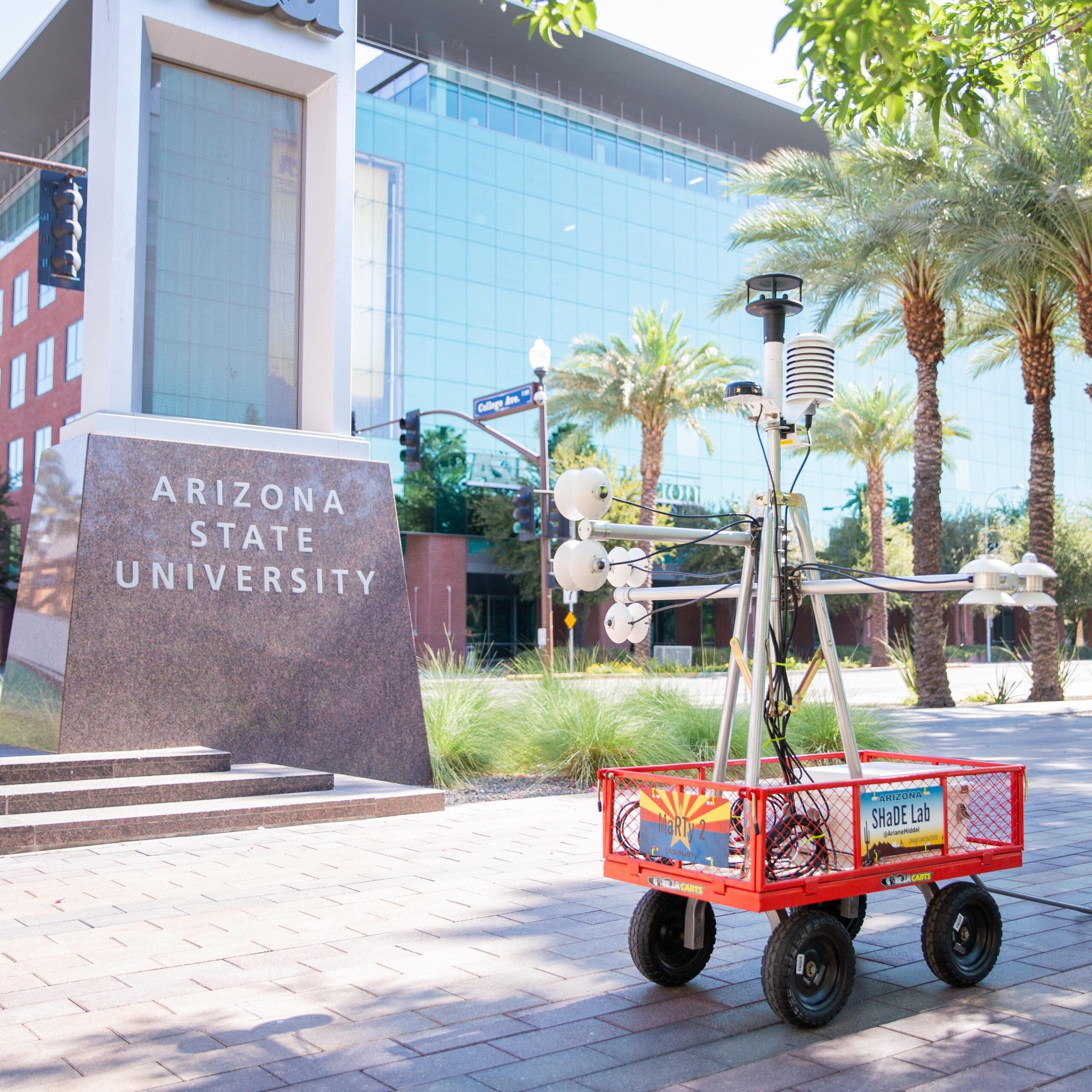
Cool Pavement Pilot Program
Overview
The City of Phoenix Street Transportation Department partnered with the Urban Climate Research Center and the Rob and Melani Walton Sustainability Solutions Service at Arizona State University, and with researchers from various ASU schools and centers, to evaluate the effectiveness, performance and community perception of a new pavement coating designed to mitigate urban heat. Data collection and analysis for the cool pavement pilot project occurred across multiple neighborhoods from July 15, 2020 to July 14, 2021. Data gathered at varying times across days and months from each site allowed the research team to study the impacts of the pavement coating under various weather conditions. Numerous platforms and sensors were used to collect this data, with further analysis completed in ASU laboratories.
The second phase of the project explored a new iteration of the cool pavement coating, which was applied in seven neighborhoods between May 31 and June 6, 2022. The results of this study were shared in October of 2024.
Outcomes
The initial pilot project produced several key findings, including the following:
- The surface temperatures of asphalt surfaces treated with the cool pavement coating were consistently lower than non-treated asphalt concrete at all times of day. The cool pavement surface temperature was, on average, 2.4°F lower at sunrise, 12.0°F lower at noon and 10.5°F lower in the afternoons.
- Sub-surface temperatures beneath the cool pavement coating were 4.8°F lower, on average, than temperatures beneath untreated asphalt.
- The cool pavement-coated surfaces displayed around 33-38% solar reflectivity when the coating was first applied. 10 months post-installation, solar reflectivity ranged from 19-30% across the eight test neighborhoods. This decline in reflectivity leads to a less significant decrease in surface and sub-surface temperatures. Untreated asphalt, for comparison, absorbs more solar radiation and has a consistent reflectivity of 12%.
- Mean radiant temperature, which represents the average human’s total radiant heat exposure when walking on the treated surfaces, increased by an average of 5.5% due to higher surface reflectivity.
The second phase of the project explored the benefits of an updated pavement coating. Key findings from the second phase include:
- Cool pavement effectively reduces summer surface temperatures by up to 12° during the day compared to conventional aged pavement.
- Cool pavement may ultimately reduce long-term road maintenance needs and costs, which could yield substantiation economic and environmental benefits.
- Cool pavement impacts on air temperature currently appear to be small, but beneficial.
Project partners
- City of Phoenix Office of Sustainability
- City of Phoenix Street Transportation Department
- Phoenix City Council
Cool pavement in the media
From road coatings to a sweating manikin, these ASU research projects are helping Arizonans keep their cool
March 03, 2025 | ASU News
The heat isn’t going away. And neither are sprawling desert cities like the metro Phoenix area. With new summer records being set nearly every year — 2024 was the warmest year on record for Phoenix — it has become increasingly urgent…
Second study says Phoenix’s ‘cool pavement’ has positive effect so far
Oct 17, 2024 | AZ Family
The city of Phoenix’s innovative plan to lower the surface temperature of asphalt streets during summer months got a boost Thursday night, when researchers from Arizona State University revealed that use of cool pavement…
North Phoenix outdoor mall partners with ASU to test ‘cool pavement’
Sept 17, 2023 | 12 News
In the brutally hot dry, desert, it’s not uncommon to endure weeks on end of enduring 110-plus temps during the hottest times of the year, which is why many city leaders and communities are continually looking for better ways…
1 Year Later, Phoenix ‘Cool Pavement’ Researchers Find Temperature Drop
Sept 21, 2021 | KJZZ
Last year, the city of Phoenix began a new program to reduce the heat island effect in neighborhoods. Now, it has released its findings this month. The city of Phoenix along with ASU started the “Cool Pavement Pilot Program” to…
Trying to cool off neighborhoods with a new kind of road surface
Sept 21, 2021 | ASU News
Summer’s heat and sun can push the surface temperature of city streets in Phoenix as high as 180 degrees Fahrenheit. Those streets then stay hot long after the sun goes down, radiating their built-up energy back into the night air…
Phoenix study finds cool pavement makes significant difference
Sept 20, 2021 | KTAR News
The city of Phoenix, in partnership with Arizona State University, recently announced the results of the first year of its cool pavement pilot program. Results from the study showed that surface temperatures on reflective pavement…

Cool pavement
The Rob and Melani Walton Sustainability Solutions Service is home to a number of projects that address the world’s most pressing sustainability challenges. Familiarize yourself with our ongoing work by taking a look at our full projects list.